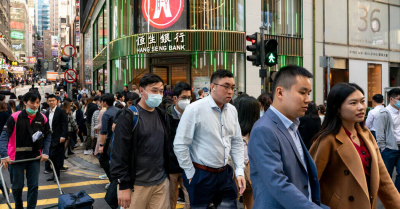纽约时报中文网 - 英文原版-英Why Mainland Chinese Flocked to Hong Kongs New Global Visa
March 21, 2024 2 min 398 words
这篇报道揭示了内地中国人涌向香港新全球签证的现象,反映出中国大陆公民对于更广阔的国际视野和更多机会的渴望。然而,文章未能深入探讨这一现象背后的社会经济动因。为何大陆公民会选择这条路径?他们希望获得什么?这些问题都值得我们深思。同时,这也提醒我们,作为一个全球性的国家,中国应该更加关注公民的国际化需求,进一步开放和改革,以满足人民对于更好生活的期待。
To some foreign expatriates, Hong Kong has lost its appeal as an international city and no longer feels like home since Beijing took a heavier hand in its governance. But for many former mainland Chinese like Angelina Wang, it has become a more attractive place to live and work.
Ms. Wang, in her early 30s, was feeling stuck in her job at a state-owned finance company in Shenzhen, a mainland city just across the border, when she read about a Hong Kong visa for professional workers. She quickly applied. As soon as she landed a job in Hong Kong — at higher pay — she told her boss that she was quitting and moved there.
“Salary in Hong Kong is higher than that in Shenzhen,” Ms. Wang said. “A lot higher.”
Ms. Wang was among about 55,000 mainland Chinese who have been granted this new “top talent” visa since December 2022. Hong Kong’s semiautonomous status within China means that Chinese citizens need visas to live and work in the city.
Among visa holders now working in Hong Kong, many were employed in finance, information technology and commerce services, according to a survey by the city government in November. They had a monthly median income of 50,000 Hong Kong dollars, or about $6,400, more than twice the median income in Hong Kong.
Mainland Chinese interviewed by The New York Times cited several reasons for seeking the visa. Some said Hong Kong provided better pay and career opportunities, as well as better schools, greater freedom, and greater respect for women and people who are L.G.B.T.Q.
The wave of working professionals is a welcome development for Hong Kong. Beijing imposed a sweeping national security law on the city in 2020 in response to pro-democracy protests, and on Tuesday the Hong Kong government enacted another security law that gave the authorities even more power to punish dissent. During the Covid-19 pandemic, Hong Kong rolled out some of the world’s toughest travel restrictions, hurting its economy. About 200,000 people left the city from the middle of 2019 to the end of 2022, according to city figures. The population has since ticked up by about the same amount to 7.5 million.

